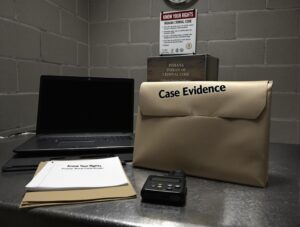Being charged with a crime in Indiana can turn your life upside down. Whether it's a misdemeanor or a felony, the implications are serious: loss of freedom, damage to your reputation, financial hardship, and long-term consequences that can follow you for years. But it’s important to remember—being charged is not the same as being convicted. Indiana law provides numerous defenses that may help you fight the charges, avoid harsh penalties, and, in some cases, have the case dismissed entirely.
At JK Sanchez Law Office, we understand the fear and uncertainty that comes with a criminal charge. That’s why we focus on aggressive defense strategies tailored to each individual case, ensuring that your rights are protected every step of the way.
Understanding the Criminal Process in Indiana
Before diving into specific defenses, it helps to understand the basic steps in Indiana’s criminal justice system. The general process includes:
- Arrest: Law enforcement detains you based on probable cause or a warrant.
- Initial Hearing: You appear before a judge to hear the charges against you, and bail may be set.
- Pretrial: This stage involves evidence exchange (discovery), plea bargaining, and motions.
- Trial: If no plea deal is reached, your case goes to trial where both sides present evidence.
- Verdict and Sentencing: A judge or jury issues a verdict. If found guilty, sentencing follows.
Having a skilled criminal defense attorney early in the process can make a significant difference. A well-timed motion or a strong pretrial strategy may eliminate or reduce charges before trial even begins.

Common Criminal Charges in Indiana
The type of defense used will depend on the nature of the charge. In Indiana, people are commonly charged with:
- Operating While Intoxicated (OWI or DUI)
- Drug possession or intent to distribute
- Battery, domestic violence, or aggravated assault
- Theft, burglary, or robbery
- Firearm or weapon offenses
- Probation violations
- White-collar crimes like fraud or embezzlement
Each category carries its own legal elements that the prosecution must prove beyond a reasonable doubt. The goal of a defense attorney is to challenge the prosecution's evidence and offer alternative explanations that create that reasonable doubt.
Legal Defenses That Work in Indiana
No single strategy works for every case, but below are the most effective defenses commonly used by experienced Indiana criminal defense attorneys:
1. Illegal Search and Seizure
If evidence was obtained without a valid search warrant, probable cause, or proper procedure, it may be excluded from your case. For instance, if police searched your vehicle without consent or a warrant and found drugs, that evidence could be suppressed. Without it, the prosecution’s case may fall apart.
2. Lack of Probable Cause
Police must have a legitimate reason to stop or arrest you. If your attorney can demonstrate that the officer lacked probable cause, this could invalidate the arrest and any evidence collected thereafter.
3. Self-Defense or Defense of Others
Indiana's self-defense laws allow you to use reasonable force, including deadly force in some circumstances, to protect yourself or others from harm. If you acted in defense rather than aggression, your actions may be legally justified.
4. Alibi
An alibi proves that you were somewhere else when the alleged crime occurred. This defense can be bolstered with witness statements, surveillance footage, digital timestamps, or receipts that establish your location.
5. Mistaken Identity
In high-stress situations, eyewitness accounts are often unreliable. If your defense can show discrepancies in the prosecution's identification methods—like inconsistencies in a lineup or video footage that doesn’t clearly show you—this may raise enough doubt to avoid conviction.
6. Entrapment
This occurs when law enforcement persuades or pressures someone into committing a crime they would not otherwise commit. Entrapment is a viable defense in drug stings, solicitation cases, and undercover operations, provided the inducement came from the authorities and not the accused’s own predisposition.
7. Duress or Necessity
If you committed a crime under threat of immediate harm—or because it was necessary to prevent greater harm—your attorney may use the defenses of duress or necessity. These are particularly complex defenses but can be powerful when supported by credible evidence.
8. Lack of Intent
Most crimes require proof that the accused intended to break the law. If the act was accidental or due to a misunderstanding, your attorney may be able to argue that no criminal intent existed, especially in cases involving property crimes or fraud.
9. Mental Incapacity or Insanity
If you were mentally incapable of understanding your actions at the time of the offense, or couldn’t distinguish right from wrong, a mental health defense might apply. This often requires psychiatric evaluation and expert testimony.
10. Violation of Miranda Rights
If police failed to inform you of your right to remain silent or to an attorney before questioning you while in custody, any statements made may be inadmissible in court. This can lead to critical evidence being thrown out.
Examples of Defenses in Action
Consider a client who was charged with OWI after being stopped at a traffic checkpoint. The officer didn’t observe any signs of impairment and lacked probable cause for further investigation. Our office successfully filed a motion to suppress the breathalyzer results, leading to the case being dismissed.
In another case, a client accused of theft was identified through grainy security footage. Our team demonstrated through time-stamped receipts and witness testimony that the client was at a different location, resulting in the charges being dropped.

FAQs About Fighting Criminal Charges in Indiana
Can charges be dropped before trial?
Yes. Charges can be dismissed if the defense identifies major weaknesses in the prosecution’s case or if procedural errors occurred. Pretrial motions and negotiations can often lead to dismissal or significant charge reduction.
What if I’m innocent?
Even if you're innocent, you need a strong legal defense. The burden of proof lies with the prosecution, but assuming that truth alone will prevail is risky. Innocent people can and do get convicted without proper legal representation.
What are Indiana’s criminal classifications?
Indiana classifies crimes as infractions, misdemeanors, or felonies. Misdemeanors (Class A, B, or C) are less severe and carry up to one year in jail. Felonies range from Level 6 (least serious) to Level 1 (most serious), with penalties up to 40 years or more in prison.
How long does a criminal case take in Indiana?
Timelines vary based on the complexity of the case, court schedules, and whether it goes to trial. Some cases resolve within a few months, while others take over a year, especially felony trials with multiple hearings and motions.
Why You Need a Criminal Defense Attorney
Indiana’s legal system is complex, and each case involves numerous procedural steps, legal requirements, and deadlines. Trying to navigate this process alone puts you at a serious disadvantage. An experienced criminal defense attorney understands how to:
- Analyze evidence and identify legal weaknesses
- File critical motions to suppress or dismiss
- Negotiate plea deals when appropriate
- Represent you in trial with confidence and skill
At JK Sanchez Law Office, we have extensive experience handling criminal cases in Indiana courts. We are committed to giving every client a thorough, strategic defense tailored to their unique situation.
Contact a Criminal Defense Attorney in Indiana Today
If you've been charged with a crime in Indiana, don’t delay. Every moment counts when your freedom and future are at stake. Let a skilled defense attorney review your case, explain your options, and fight for your rights.
Contact us today to schedule a confidential consultation with JK Sanchez Law Office and learn how we can help you beat the charges and move forward with your life.



